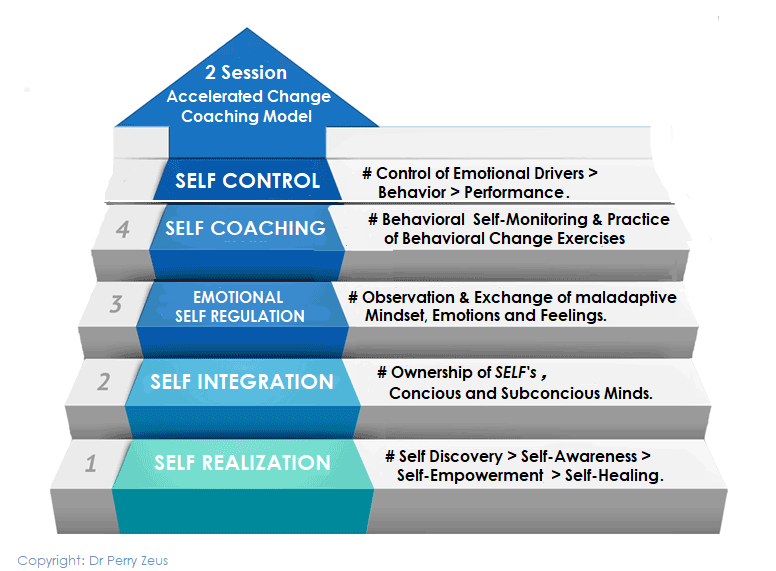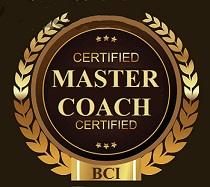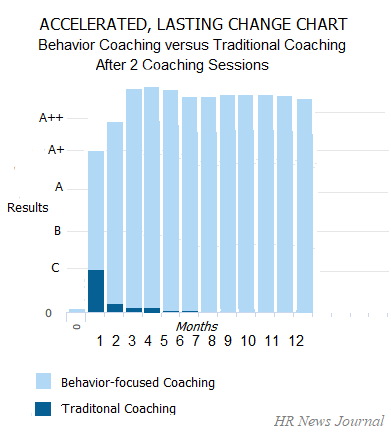|
The Behavioral Coaching Model:
-
Achieving
Behavioral Change with validated Coaching Techniques
(includes extracts from text book 'Behavioral
Coaching' by Zeus and Skiffington - McGraw-Hill Professional
Publishing)
The term "behavior" is frequently misused in training and coaching literature/programs,
with little attention paid to methods of actually changing
behaviors and insuring that these changes are lasting.
The definition of behavior to which
behavioral coaching subscribes is: the actions, responses and
reactions of an individual, team or organization. Behavioral coaching
can also be defined as the science and art of facilitating the
performance, learning and development of the individual or team, which
in turn assists the growth of the organization. The overall goal of
behavioral coaching is to help individuals increase their
effectiveness and happiness at work, study and/or in a social setting.
Everyone involved in personal and
professional development needs to understand and appreciate basic
behavioral processes and how these relate to individual functioning
and organizational performance.
Many organizations and coaches claim to
use behavioral coaching simply because they are dealing with behavior.
On closer scrutiny, however, they are merely attaching a new name to
the old workplace counseling model; that is, the "coaching"
is remedial, occurs on an as-needs rather than an ongoing basis,
involves little monitoring or evaluation and does not attend to
preventing slippage. Furthermore, some professionals claim to practice
behavioral coaching simply because they employ personality profiling.
Behavioral coaching goes beyond false promises about change and
examines what we can and cannot change. It presents research-based and
scientifically validated means of instilling new optimism for coaches and their
clients about achieving change.
Behavioral coaching integrates research
from many disciplines into a validated, user-friendly model of
practice. It incorporates knowledge from psychology (behavioral,
clinical, social, developmental, industrial and organizational),
neuroscience, neuropsychology, systems theories, existential philosophy, education and the management
and leadership literature.
One of the reasons why behavioral
techniques are so widely accepted is that they allow for data to be
gathered on specific, targeted behaviors impacting the
application of a professional skill. By using appropriate
validated, behavioral change instruments, these targeted behaviors can
easily be measured and evaluated in a rigorous manner.
Behavioral
coaching, with its emphasis on research and evidence, provides
individuals and organizations a validated and proven system that
greatly increases their chances of effecting lasting behavioral
change.
Changing behavioral patterns cannot be
achieved by using the many simplistic, outdated models of
coaching still widely promoted in the coaching
industry/literature. Many so-called "certified coaches"
churned out by the "coaching associations" are simply doing
more harm than good. Meantime, many large, high-profile
coach training schools are still teaching simplistic models of
coaching that employ re-labeled, old performance counseling
strategies or, in some cases, scientifically unproven NLP type fuzzy
techniques.
Because coaching is still
very much in the early
stages of its development, there is no agreed-upon, all-embracing
model of the coaching process and practice. That said, in the last
decade there has been a definite move towards behavior-based
coaching towards
constructing a comprehensive, evidence-based coaching model.
A coaching model cannot be procrustean. It
requires an in-built flexibility and adaptability so that coaching
programs can be tailored to fit the specific needs of each client and
coachee. For example, a coach needs to take into account their own, as
well as the coachees', differences in personality, knowledge, skills
and abilities. Coachees also vary in motivation and preparedness for
change.
As well as individual factors, each
coachee exists within various systems, both personal and professional.
These affect how a coaching program is conducted, as do factors such
as the organizational culture and structure, available resources and
the organization's business objectives.
How
Behavioral Coaching is being used today:
(Adapted from
the book 'Behavioral Coaching' by Skiffington and Zeus -McGraw-Hill
Professional -New York)
The Behavioral
Coaching Institute (Est. 1994).
Over the last two decades of
conducting our behavioral coach training and certification courses, we have
tracked the ongoing development of Behavioral Coaching (BC). Some
of the major areas where
we have trained coaches to successfully work/specialize in include:
behavioral health coaching in the workplace, executive coaching (CEO’s),
transformational leadership coaching, team coaching, business coaching, coaching female
executives, coaching in education,
cross-cultural coaching, sales coaching, coaching in the health
care industry and personal coaching.
Today, the Institute
is the world's leading developer and supplier of proprietary
behavioral coaching models, tools and techniques to 100's of the
world's leading organizations. Our specialist
Coach Training Schools have produced 1,000's of graduates
from over 65 countries who have obtained elite
certification and a behavioral coaching toolkit that stands
them at the head of the global coaching field.
What is
High Performance Behavioral
Coaching?
Mainstream / generic workplace coaches are trained to be goal
and skill focused. Whereas, High Performance Behavioral Coaches
(in the workplace, educational institutions etc) are focused on
the person's environment affecting their performance, happiness
and well-being. Both work successfully together, however, the
High Performance Behavioral Coach uses a brain-mind-body
approach to address developmental needs whereas the generic
coach must stay away from the mental / physical domains and
psychological change models they are not trained in. From the
client's point of view, it's simply about the kind of assistance
they need eg; brain-mind-body or positional skills coaching or
both.
Difference between
behavioral coaching and mental or cognitive coaching.
It is important to note that behavioral coaching is a blanket term
incorporating whole brain, mind, body approach. Whereas mental
/ cognitive coaching focuses on the mind only. It follows that
high performance behavioral coaching incorporates cognitive coaching.
With the new,
changed economic landscape (post-pandemic) there is an unprecedented demand for
High Performance Behavioral Coaching for
in-house or external practitioners.
- The Need for High Performance Coaching -in the not so good
times...and good times.
Yesterdays dated
definition of workplace performance was focused primarily on
positional and mental skills training. The missing corporate key for
success was ensuring people were provided the brain-mind-body
development and support they required to be their best, fulfil
their potential and be happy and healthy.
Read more>

Read more>
Executive
coaching
Behavioral Coaching
for leadership development occurs with selected executives, senior
managers and teams or as part of a company-wide coaching
initiative. Coaches, both internal and external, are also
contracted to work within a specific business unit or with
individual referrals. Some areas of leadership coaching include:
leaders in transition, new hires, high potential individuals being
‘groomed” for promotion, individuals in new positions,
management competencies to complement technical expertise,
developing and communicating a strategic vision, strategic
planning, culture change, ambassadorship, leading executive teams,
overcoming isolation and interpersonal skills such as
communication and dealing effectively with colleagues and with
power.
Read more>
Business
coaching
Business
coaches work with small to medium enterprises to develop and grow
the business. Coaching entrepreneurs, start-ups, mergers and
developing a business in order to sell it are some of the more
common areas of business coaching. Within these broad categories,
Behavioral Coaches, who usually have a background in small
business, coach for business or strategic planning, developing and
growing the market, staff relations, networking, life balance,
time management and partnership conflicts.
Read more>
Transformational
leadership
and behavioral coaching
Behavioral Coaching
leaders for transformational changes involves changing the very
way they think, increasing their ability to deal better with
ambiguity and be more creative and reflective. It effects change
in what the leader knows and enhances their ability to step back
and reflect on assumptions previously taken for granted. These may
be about culture, values, the self, organizational objectives and
vision.
Some
documented benefits of leadership coaching include: enhanced
ability to develop and foster trust; increased accountability
within the organization; developing and maintaining more
satisfactory relationships with the Board, shareholders and
employees; enhanced credibility and influence as an ambassador;
increased ability to align others to the company’s vision and
mission; successful change management projects; enhanced
managerial competencies; a growth in self-responsibility in self
and others; developing a culture that truly values learning and
development.
Read more>
The
manager as coach
and
behavioral coaching
Behavioral Coaching
involves managers aligning their team and employees to the
organization’s objectives and vision and fostering independent
and creative problem-solving. Another
expectation of managers is that they develop their staff. There
is, after all, a consistent body of research that shows a direct
link between human capital management and superior shareholder
returns.
Behavioral Coaching
offers managers a methodology for enhancing the individual or
team’s current skills. They thereby develop employees who are
committed and trusted to use their discretion and judgment to act
in ways that are congruent with organizational objectives and
goals. Managers have to manage and coaching is simply a vehicle
for them to enhance their management skills.
Coaching
executive women
Women
executives not only face those issues common to all leaders as
discussed above, but have to contend with other challenges, some
external and some a function of their internalized beliefs and
misconceptions about women in leadership.
Because
of the increasing number of women in the workforce and in
executive positions, there is a greater demand for women to be
coached. Some of the most common coaching issues that surface
include: life balance and the expectations of peers and family,
political maneuvering and relationship building with key
stakeholders, being assertive, delegating and managing dissent and
conflict.
Coaching
Program Managers (CPM’s)
and
behavioral coaching
Coaching
Program Managers, trained in Behavioral Coaching methods and
techniques, fulfill many roles. Typically, they are involved in
coaching programs from their inception. As internal coaches,
they often introduce coaching into the organization and oversee
and manage its delivery. They may also be the person designated
to manage a coaching program introduced by an external coach
provider.
Sports Coaching
and
behavioral coaching
B ehavioral coaching can be likened
to giving your athletes or team their own private brain-mind-body gym.
The
brain is like any other organ in the body. If you exercise it, it
performs better. An efficient brain can accomplish more, with
greater accuracy, in less time.
With
repeated exercise, just as muscles respond and gain strength, the
brain similarly learns to self-regulate more and more optimally. Behavioral coaching is
highly effective because it helps athletes improve a wide range of brain functions.
Teaching
athletes to easy-to-use, practical, self-empowering neuropsychological
techniques (to practice once a day for 15 mins).
Latest studies report,
after just a few minutes of regular use, decreased impulsivity and
anxiety, better mental clarity, more restful sleep, improved mood,
and a host of other side benefits.
Applying neuroscience, neuropsychology and working with the
brain-mind-body continuum legitimizes the work of a professional
sports coach.
NOTE: Athletes are empowered to self-coach themselves and engage in
regular neuro practice exercises anytime they have 10 free minutes.
Recent studies confirm that significant, lasting,
measurable, performance improvement occurs in just 2 to 3 weeks.
A person’s ability to focus and concentrate is hindered when stress
and tension is carried in the body. Behavioral coaching increases
resilience and an individual’s ability to deal with stress. It
improves mental clarity, decision making capabilities and focus.
Bottom line performance, competency and efficiency are enhanced.
Read More >
Behavioral
Coaching
and Education
One
of the expanding areas of Behavioral Coaching is in the field of
education. Behavioral Coaches provide individuals, groups,
teachers, students and administrative personnel with a wide
variety of coaching interventions. They train senior teachers to
coach new and experienced teachers and students as well as
establishing and monitoring peer coaching programs. Coaches also
work with students on life skills, study skills and social skills
as well as career choice and preparation.
-Coaching
the teacher
BC
is not simply another term for traditional mentoring or peer
supervision between teachers. Instead, coaching focuses on
assessment of the teachers’ strengths and weaknesses, developing
a personalized action plan and working to the coachee’s agenda
rather than that of the governing educational body. The coach’s
role then, is distinct from supervision and is unrelated to
performance evaluation. Of course, if the coachee wishes to set
objectives around performance evaluation, the coach acts in a
strictly confidential role as support, guide and giver of
feedback.
-Peer
coaching
Experienced
teachers also derive significant benefits from coaching,
especially in relation to enhancing their skills and general
professional development as educators.
The aim of peer coaching
is to refine present teaching skills and it has proved
particularly effective with senior teachers.
Peer
coaching allows teachers to share a professional dialogue about
the science and art of teaching. It involves teachers receiving
support, assistance and feedback from fellow teachers. Typically,
all teachers involved in the peer coaching program are trained in
the fundamentals of BC including goal setting, action planning,
interpersonal and helping skills.
-Coaching
students
Teachers,
of course, have to teach and they do not have the resources or
time to individually coach all students. However, two types of
coaching, namely Cognitive
Coaching and Coaching for children with Attention Deficit Disorder
have been translated to the classroom.
Teachers
also employ BC techniques when coaching students in a group
setting. The group may be composed of students who have a common
problem to address or may be part of a life skills coaching
curriculum. Indeed, a study of socially-rejected fifth graders
found that coaching improved their social skills and increased
their ability to be liked by peers.
-Coaching
for academic success
Because
few high schools, colleges or universities have the resources to
offer students individualized attention, more students are
employing Behavioral Coaches to work with them on both personal
and academic issues.
Career
coaching
Behavioral Coaching
for careers and career transitions offers individuals support,
resources and guidance during what are often stressful
times. Many organizations recognize the importance of career
development as a means of retaining staff. Hence, they offer
internal career coaching programs often conducted by external
coaches.
Coaching
in health-care settings
Behavioral
Coaches work with individual physicians, supervisors and
administrative personnel in hospitals and other public and private
health organizations. Some of the coaching areas include: personal
leadership, management skills, managing interpersonal conflicts
with and among staff, career development and career transition.
Executive coaching services around leadership and management
skills in hospitals typically focus on competencies for doctors in
management and leadership positions. These include resource
allocation, strategic planning and meeting the demand for
profitability while maintaining medical values and ethics.
Read more>
Sales
coaching
In
our first book (‘The Complete Guide to Coaching at Work”), we
explored sales
coaching in relation to the following areas: negative beliefs and
expectations that can impact on sales performance and the
coach’s role in working with salespersons in the ‘flow’,
‘panic’ and ‘drone’ zones. We also discussed coaching
skills for the sales manager. Increasingly, Behavioral
Coaches work with sales
managers to enhance their management and coaching competencies.
Cross-cultural
coaching
Coaching
individuals and teams in cross-cultural settings is a rapidly
expanding niche for Behavioral Coaches. Such coaches are
specialists who know about and can guide and support others
through the complex process of cultural adaptation.
Chartered
Public Accountants (CPA’s) and coaching
Increasingly,
Chartered Public Accountants (CPAs), attorneys and other financial
advisors are coaching other practitioners and entrepreneurs as an
add-on their traditional services. CPA’s particularly, are
recognizing the need to become a trusted advisor to their clients,
being able to work on vision, mission and strategic planning.
Studies show that their clients benefit from coaching
especially in the areas of smarter goal setting and a more
balanced life style.
Some other
areas where
Behavioral
Coaching is used:
The
application of Behavioral Coaching is not limited to the above
mentioned areas. It also entails coaching coaches including those
in the executive, business, personal and sports arenas.
Furthermore, Behavioral Coaching is carried out in the military,
the civil service and other public institutions and non-profit
organizations as well as the legal profession. Christian coaching
and Spirituality coaching also employ
behavioural
coaching methods, tools and
techniques.
In
summary, the application of behavioural
coaching
methodologies is employed in a
growing number of areas. These include corporations, small
businesses, public and private organizations such as health and
education and the personal development realm.
Within this vast arena, Behavioral Coaches form an
alliance based on trust and commitment that aims to foster
productivity, growth and well being according to the coachee’s
agenda.
Note:
One of the first published case studies (Mold, 1951) on the
effect of coaching was Manager's as a Coach. The
case study focused on creating a coaching culture and involved
each manager coached by their superior. The program objectives,
including the manager's exploring and accepting their emotional
competencies, such as fear and aggression, were all met.
| |
|

-
Accelerated Distance Learning!
The Institute's fast-tracked courses enable to
fit
study around your busy schedule. |
|
|
|
| |
|
|
|
|
| |
|
MASTER COACH COURSES available in:
|
| |
 |
|
Executive / Workplace Coaching,
|
|
|
|
|
 |
|
Emotion Focus
|
|
|
|
|
|
|



